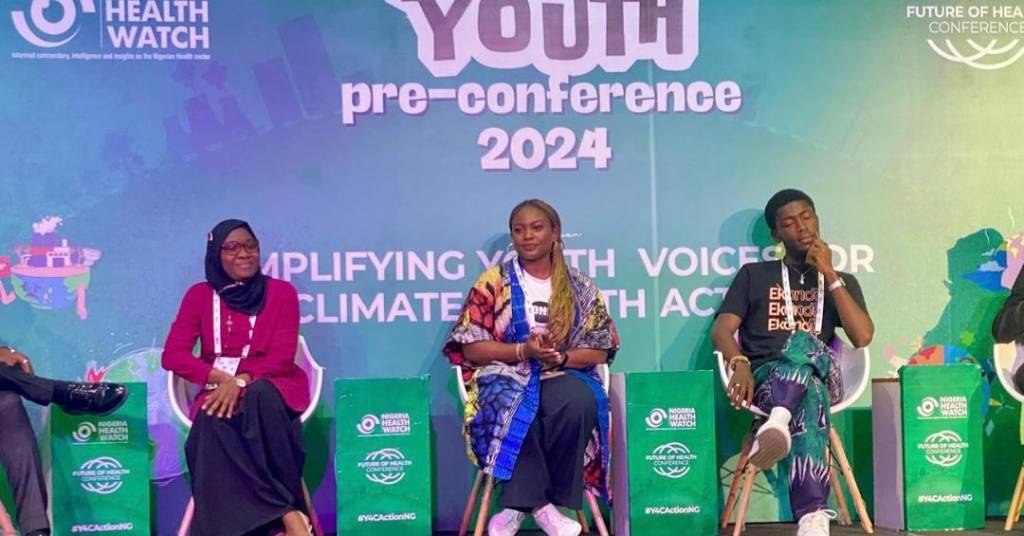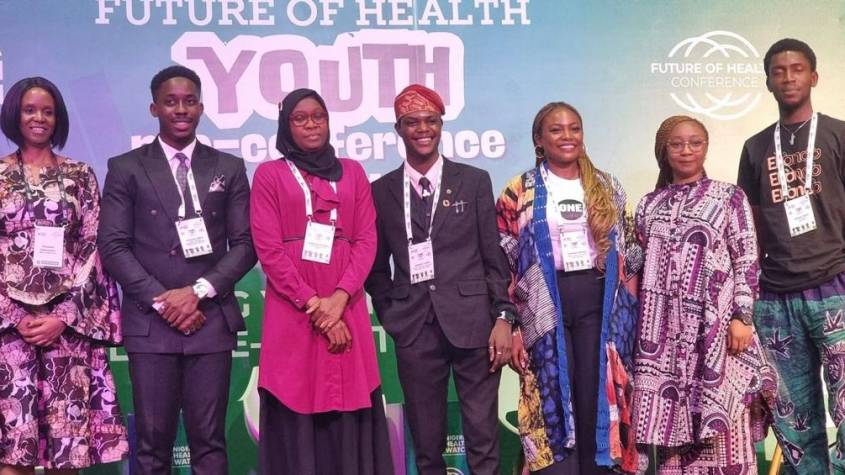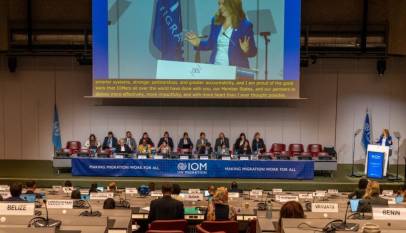2024 Future of Health Conference: Amplifying Nigerian Youth Voices for Climate-Health Action
The Nigeria Health Watch’s 10 Future of Health Conference Youth Pre-Conference themed “Amplifying Youth Voices for Climate-Health Action” brought together young people from various fields such as health, agriculture, and environmental sectors who proffered tangible solutions for mainstreaming youth voices in climate-health action.

Nigeria is increasingly dealing with the fallouts of climate change, which have profound implications for its natural environment and the public health of its people. Among other severe weather events, the country is experiencing rising temperatures, erratic rainfall patterns, droughts, floods, and desertification.
For instance, in 2022, Nigeria suffered from devastating floods with distressing impacts on the lives and livelihoods of over 1.4 million people, resulting in substantial damage to infrastructure, farmlands, and housing, particularly in states like Kogi, Benue, and Adamawa. The floods exacerbated existing vulnerabilities leading to a rise in waterborne diseases and food insecurity as crops were destroyed and access to clean water was compromised.
Additionally, many states in northern Nigeria are facing the threat of desert encroachment, which threatens livelihoods and induces conflicts over scarce resources such as water and grazing areas. These climate and environmental challenges are directly linked to public health, as the fallout of climate change increases the spread of infectious diseases and heightens the risk of malnutrition among vulnerable populations.
Against this backdrop, the 2024 Nigeria Health Watch’s 10th Future of Health Conference (FHC) themed “From Evidence to Action: Building Resilience at the Climate-Health Nexus,” was held last week in Abuja, Nigeria. The milestone conference spotlighted the vital link between climate change and health, calling for decisive and evidence-based policies to curb climate-related health risks and strengthen resilience within communities across Nigeria and beyond.
Thus, the Future of Health Youth Pre-Conference, themed “Amplifying Youth Voices for Climate-Health Action,” was held a day before the actual 10th FHC in Abuja, Nigeria. It was the first time the premier health conference was preceded by a youth pre-conference providing a youth angle to the climate-health nexus.
“We Can’t Ignore Ignore Youth Voices in Climate Conversations” – Ihekweazu
In her opening address, Vivianne Ihekweazu, Managing Director of Nigeria Health Watch, articulated the necessity of centering the conference’s discussions around youth voices. “What makes this year’s [conference special] is that we are focusing on the intersections of climate and health. As we know, Africa has a very young population, with over 400 million people aged between 15 and 35. Ignoring their voices in discussions about climate change makes no sense, particularly when considering the magnitude of the challenges we face.”
Ihekweazu emphasized that climate change is not merely an environmental concern but a profound health crisis that threatens the well-being of many. “The human face of climate change is reflected in the health impacts it has on all of us. We see how rising temperatures and shifting weather patterns exacerbate existing vulnerabilities, leading to the spread of infectious diseases and food and water insecurity. The reality is that 70% of our states are currently facing flooding issues. Imagine how that affects our daily lives and the already fragile health infrastructure.”
To this end, Ihekweazu urged young people to leverage technology and innovation and utilize digital platforms to disseminate climate information and advocate for change. “Technology is a powerful tool that can enhance our advocacy efforts. Whether it’s through social media campaigns or creating content that raises awareness, we must harness the tools at our disposal to drive meaningful change.”
One of the key sub-themes of the pre-conference was how financial constraints often impede youth activism. “While financial resources are important, young people have a powerful voice that is not constrained by finances. Other countries have utilized youth voices to lead change effectively. You must use your platforms, whether social media or local community gatherings, to advocate for environmental policies and climate action,” Ihekweazu told the young activists.
“Youth Can No Longer be Passive Observers in Climate Action” – Idowu
In his keynote address titled, “Once Upon Planet Earth”, Olumide Idowu, Co-founder of the International Climate Change Development Initiative (ICCDI), emphasized the critical role of youth voices in climate advocacy and the necessity of their involvement in negotiations and policymaking processes. He underlined the need for young people to not just participate in climate negotiations but ensure their voices are heard in all climate conversations.
“As someone who has attended the Conference of the Parties (COP) since 2013, I can tell you that while I’ve seen some changes, the fundamental challenge remains: we need to ensure that the youth are not just present but are influential in these discussions. Young people need to understand the national policies that govern climate action. We need to amplify our voices to ensure we are not only part of the conversation but are also leading it. We can no longer be passive observers; we must actively engage in the process of change,” Idowu charged.
The climate activist however said for young people to effectively participate in climate action, they must learn to build multistakeholder partnerships across crucial sectors. “If we want to engage in meaningful climate action, we must look at how we can build partnerships across various sectors: government, civil society, and private enterprises. These partnerships can amplify our efforts and lead to tangible results in addressing climate change and health issues.”
“Climate Change No Longer Distant Threat” – SFH MD
In his remarks, Dr. Omokhudu Idogho, Managing Director of the Society for Family Health (SFH), said climate change was no longer a distant threat underscoring the climate-health nexus. “Climate change is not a distant threat; it is a crisis we are facing right now. With increasing humanitarian emergencies, we see a direct correlation between climate-related disasters and health outcomes. We must elevate this conversation to include the voices of our youth because they are the ones who will bear the brunt of these crises in the future.”
Mr Idogho pointed out that the health gains from climate mitigation and adaptation efforts greatly outweigh the costs involved and underlined the need for a “people-first” approach to climate action, ensuring that the perspectives of young people, especially those affected by environmental changes, are integrated into policy-making. “This is a children’s rights emergency. Natural disasters, droughts, and floods are already limiting young people’s access to basic human needs like food, water, housing, and education.”
“We Must Hold State, Local Governments Accountable on Climate” – OSPRE DG
One of the highlights of discussions at the pre-conference was the need for young Nigerians to familiarize themselves with national climate policy documents and legislation. While speaking at a panel discussion featuring leaders from diverse sectors, Chris Ngwodo, Director-General of the Office for Strategic Preparedness and Resilience (OSPRE), urged youths to direct their advocacy efforts not only towards the federal government but also state and local authorities.
Ngwodo elaborated on the responsibilities that young people carry. “Local action is crucial. You need to understand the intricacies of what you’re advocating for. This means educating yourselves about the policies in place and using your voices effectively. The government has a role, but so do you. Each one of you can become an advocate in your communities, raising awareness about the impacts of climate change.”
Major Takeaways from FHC’s Youth Pre-Conference
The climax of the 10th Nigeria Health Watch Youth Pre-Conference was young climate and health activists sharing their stories. One of the crucial perspectives shared by Nigerian youth in tackling climate change was the fact that young people not only have a responsibility to speak and advocate for climate action but also to take action themselves. The event was no doubt a resounding affirmation of the potential that lies within Nigeria’s youth in climate action.
One of the key takeaways from the intergenerational dialogue at the conference was the crucial importance of follow-up and monitoring of policymakers’ commitments in the area of climate action. Ultimately, the conference was a kind of launch pad for deeper conversations on the imperative of youth engagement with local and national leaders to ensure the commitments made during the event translate into tangible actions.
Indeed, the FHC’s maiden youth pre-conference generated momentum for sustained youth engagement on the critical intersection of climate change and public health. The collective determination of young Nigerians to hold their leaders accountable for climate and health may just signify a turning point in the fight against climate change, one that will reshape the future health and well-being of Nigerians. By amplifying their voices and advocating for climate-health action Nigerian youth are championing a sustainable and equitable future for all.













